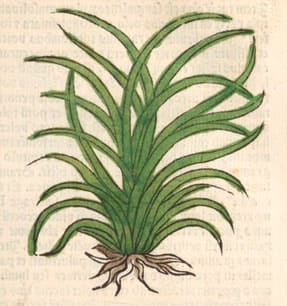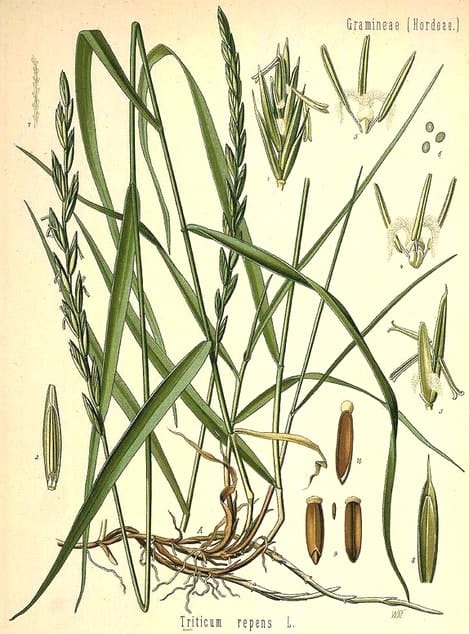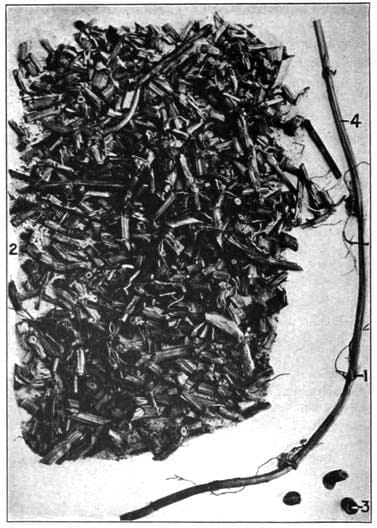Gramen, Couch-grass
Quick-grass, Dogs-grass, Quitch-grass, Triticum Herbarius latinus, Petri, 1485
Herbarius latinus, Petri, 1485 Koehler, Medizinal Pflanzen, vol. 2, 1890
Koehler, Medizinal Pflanzen, vol. 2, 1890 TRITICUM REPENS ROOT AND RHIZOME
TRITICUM REPENS ROOT AND RHIZOME1, Node with circle of roots. 2. Mass of chopped rhizomes.
8. Cross-section of the rhizome with hollow pith. 4. Furrowed internode.
Squibb’s Atlas of the Official Drugs, Mansfield, 1919
Botanical name:
Elymus repens (syn. Triticum repens, Agropyron repens, Elytrigia repens)
A number of other ‘Quick’ or ‘Running’ Grasses have been used similarly.
Parts used:
Root; rarely the Seed (Seed is a stronger diuretic)
Temperature & Taste:
Cool, dry. Sweet
Classifications:
2A APERIENT MEDICINES
Uses:
1. Clears Heat and Damp, Benefits the Kidneys, Promotes Urine:
-Fluid accumulation, Edema (seed is a stronger diuretic)
-frequent, scanty, burning urine, Dysuria, Strangury
-chronic Prostatitis, and Urethritis; Ulcers of the urinary tract
–strangury, ulcerations of the bladder, Calculi (Pliny)
-‘For excruciating pains in the bladder, some recommend a decoction of gramen, boiled down in wine to one half’ (Pliny)
-Gravel and Stones
-Jaundice; Diarrhea
-Beneficial in Diabetes
2. Opens Obstruction:
-obstructions of the Liver, Spleen and Bladder
-Liver stagnation
-Gall Stones
3. Clears Heat, Stops Bleeding:
-Spitting of Blood (juice) (Tabernaemontanus)
-Scrofula, Blood Tumors
-Chronic Eczema, Syphilis
4. Moves the Blood:
-benefits the Heart
-adjunct in Amenorrhea
5. Kills Worms
-adjunct for Worms
Dose:
1. Best Decocted or Infused in wine, or to use the Tincture (unless the person has heat or Fever); it is more opening and diuretic when taken with alcohol.
DECOCTION: 3–6 grams, up to 12 grams, with between 15–30 grams being used for Jaundice and Gallstones;
TINCTURE (1:5 in 40% alcohol): 4–12, up to 15 mls, 2–3 times daily (to help pass Urinary calculi, up to 15 or 20 mls may be given in hot water);
FLUID EXTRACT (1:1 in 25% alcohol): 3–10mls;
FRESHLY EXPRESSED JUICE: 10–50 mls.
Comment:
Cough Grass is one of the important Diuretic herbs which doesn’t deplete the Yin as most Diuretics. In this respect, it is similar to Plantain seed (Che Qian Zi) and Water Plantain root (Ze Xie) in TCM.

Main Combinations:
1. To promote Urine:
i. Couch Grass with Calendula
ii. clear Stones, and for Bladder wounds, Couch Grass with Parsley root (Herbarius latinus, Petri, 1485)
iii. Couch Grass with Parsley seed, Juniper
iv. Couch Grass with Dandelion root and Fumitory (Saunders)
v. Couch Grass with Madder, Licorice, Potassium nitrate (Pharmacopoeia Hispana, 1798)
2. Difficult, burning or painful urination:
i. Couch Grass with Plantain seed
ii. Couch Grass with Barley, 4 Cold seeds
iii. Couch Grass with Melon seed, Marshmallow, Licorice
iv. Couch Grass with Barley, Centaury, Agrimony, Licorice
v. Couch Grass with Birch, Nettle, Horsetail, Juniper
3. Scanty, painful or cloudy urine:
i. Couch Grass with Celery seed, Juniper berry
ii. Couch Grass with Agrimony, Licorice
4. Kidney disease with heaviness, drowsiness, lower back pain, scanty urine but with frequent desire to urinate, Couch Grass with Pellitory of the Wall, Cleavers, Juniper berry, Alchemilla Arvensis (Parsley Piert) (half oz. each), decoct in 1 quart (approx 1 liter) of water for 5 minutes. Take a wineglassful 3–4 times per day. (Valuable Herbal Prescriptions, late ‘s)
5. Urinary disorders with Yin deficiency, Couch Grass with Asparagus root, Marshmallow root, Licorice
6. Fever, Couch Grass with Licorice, Violet and Raisins
7. To purify the Blood in Acne, Abscess, Skin disease, Arthritis, Gout:
i. Couch Grass with Chicory, Fumitory, Rhubarb
ii. Couch Grass with Butchers Broom, Fennel root, Parsley root, Cleavers, Dandelion, Currants
8. To promote Menstruation, Couch Grass with Madder, Mugwort, Marjoram, Hyssop, Calamint
9. Heart tonic, Couch Grass with Mistletoe, Motherwort, Balm, Yarrow, Shepherd’s Purse, Rue, Yarrow, Dandelion, Fumitory (Treben)
10. Wounds, Couch Grass decoction to which Frankincense and Myrrh are added. (Pliny)
Major Formulas:
Decoction to Purify
Syrup of Mugwort Lesser (Bononiense)
Syrup of Marshmallow (Fernel)
Cautions:
None noted
Main Preparations used:
Distilled Water
-
Extra Info
-
History
|
‘Gramen is of all herbaceous productions the most common. As it creeps along the ground it throws out jointed stems, from the joints of which, as well as from the extremity of the stem, fresh roots are put forth every here and there. In all other parts of the world the leaves of it are tapering, and come to a point; but upon Mount Parnassus they resemble the leaves of the ivy, the plant throwing out a greater number of stems than elsewhere, and bearing a blossom that is white and odoriferous. There is no vegetable production that is more grateful to beasts of burden than this, whether in a green state or whether dried and made into hay, in which last case it is sprinkled with water when given to them. It is said that on Mount Parnassus a juice is extracted from it, which is very abundant and of a sweet flavour. ‘In other parts of the world, instead of this juice a decoction of it is employed for closing wounds; an effect equally produced by the plant itself, which is beaten up for the purpose and attached to the part affected, thereby preventing inflammation. To the decoction wine and honey are added, and in some cases, frankincense, pepper, and myrrh, in the proportion of one third of each ingredient; after which it is boiled again in a copper vessel, when required for tooth-ache or defluxion of the eyes. |
A decoction of the roots, in wine, is curative of griping pains in the bowels, strangury, and ulcerations of the bladder, and it disperses calculi. The seed is still more powerful as a diuretic, arrests looseness and vomiting, and is particularly useful for wounds inflicted by dragons [a type of snake]. There are some authorities which give the following prescription for the cure of scrofulous sores and inflamed tumours :— From one, two, or three stems, as many as nine joints must be removed, which must then be wrapped in black wool with the grease in it. The party who gathers them must do so fasting, and must then go, in the same state, to the patient’s house while he is from home. When the patient comes in, the other must say to him three times, “I come fasting to bring a remedy to a fasting man” and must then attach the amulet to his person, repeating the same ceremony three consecutive days. The variety of this plant which has seven joints is considered a most excellent amulet for the cure of head-ache. For excruciating pains in the bladder, some recommend a decoction of gramen, boiled down in wine to one half, to be taken immediately after the bath’. (The Natural History of Pliny, trans. by Bostock and Riley, Vol. 5, 1856) |
